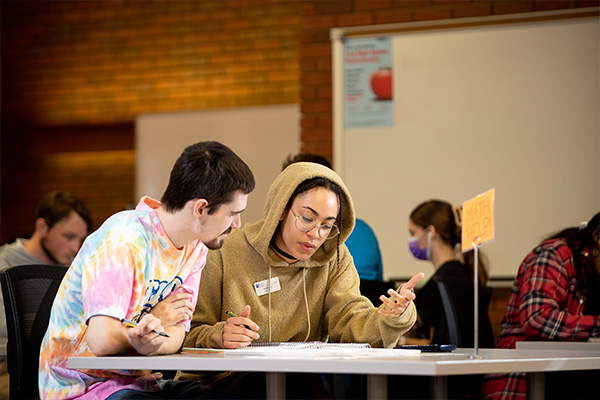Get Started with Accommodations
The Access Office approves a variety of support to students with documented disabilities including:
- Testing accommodations
- Course materials/class notes
- Assistive technology
- Deaf services
- Support staff
Students who are new to STLCC, or have been at STLCC and have never requested services should begin here. Please follow these directions to start your journey with STLCC and the Access Office!

Who Can the Access Office Help?
New to College or New to Access Services
Students who are new to college, or who have been in college but have never requested services from the Access Office, should begin here.
Returning Students
Notify your Access Specialist that you have registered for the semester as soon as possible. Even if you have stopped out for a semester or two, we will still have your information on file. Instructor Notification will be automatically routed to your my.stlcc.edu address. Should you find that you have additional needs for new classes, schedule an appointment with your Specialist right away.
High School Students
Dual Enrollment/Dual Credit/Early College can be a great option for students who have disabilities. Increased autonomy, a change of environment, and flexibility are a few of the reasons students may seek to start their college career early.
Future Students
Transition info related to counselors and prep for accessing STLCC.
Visiting Students
Students who are visiting our campus from another college/university should provide a copy of their approved accommodations from their home institution and complete an application for services. Additional documentation or paperwork is generally not required, but a meeting to review STLCC processes is recommended.
Deaf Students
If you are a Deaf student, or would like to request an interpreter then contact Deaf Services.
Continuing Education/Workforce Solutions Group
The Access Office works with students who are life-long learners in our continuing education programs. If there are classes, programs, trips of interest and you need accommodations to participate, please contact the office most convenient for you and we will discuss our services. Please note that it may take a little time to get things set up for you, so please give us as much advance notice as possible!
Temporary Disability / Injuries
The Access Office provides support to students who have temporarily disabling conditions such as broken bones, hospitalizations, or surgeries. We understand that temporary disabilities are most often unplanned, so we will work with you to put services in place as soon as possible. Contact our office right away to begin the process. Medical documentation may be required to support your needs. Possible accommodations include: Alternate seating, allow to stand, move about, elevate extremities, Note-takers, digital recorders, more time for testing.
Pregnancy
A person with a "normal" pregnancy isn't considered to be a "person with a disability" as defined by disability law (Section 504 or ADA). If your pregnancy involves some medical complications that impact one or more of your major life functions, you might be considered "temporarily disabled," and thus eligible to register with the Access Office. The office would want documentation from your doctor about the medical complications in order to determine how best to serve you. The Access Office has procedures in place for students with temporary disabilities. Accommodations are determined on a case-by-case basis, depending on an individual's circumstances. Pregnant or parenting students should refer to STLCC's Title IX policy.
Contact Offices
Access Specialists are available to answer questions or respond to any concerns. Contact the Access Office on your campus. Online students are encouraged to contact any of the offices below. All Access Offices use the same fax number: 314-228-2013. If your questions or concerns are of a more general nature you can use our district email.
Florissant Valley
Student Center SC-241
8 a.m.-6 p.m. Mon & Thurs
8 a.m.-4:30 p.m. Tues & Wed
9 a.m.-4:30 p.m. Friday
314-513-4551
fvaccess@stlcc.edu
Forest Park
West Tower 224
8 a.m.-6 p.m. Mon & Thurs
8 a.m.-4:30 p.m. Tues & Wed
9 a.m.-4:30 p.m. Friday
314-644-9039
fpaccess@stlcc.edu
Meramec
Clark Hall AD-120
8 a.m.-6 p.m. Mon & Thurs
8 a.m.-4:30 p.m. Tues & Wed
9 a.m.-4:30 p.m. Friday
314-984-7673
mcaccess@stlcc.edu
South County
Student Services Area
8 a.m.-6 p.m. Mon & Thurs
8 a.m.-4:30 p.m. Tues & Wed
9 a.m.-4:30 p.m. Friday
314-984-7200
scaccess@stlcc.edu
Wildwood
Student Enrollment
8 a.m.-6 p.m. Mon & Thurs
8 a.m.-4:30 p.m. Tues & Wed
9 a.m.-4:30 p.m. Friday
636-422-2000
wwaccess@stlcc.edu
Harrison Education Center
Front Desk
8 a.m.-5 p.m. Mon-Fri
314-763-6000
Our ADA Compliance Officers
District Office
Shannon Nicholson, MC, LPC
Director for Community Standards
Title IX Coordinator
314-539-5345
snicholson29@stlcc.edu
Corporate College
Human Resources
Director of Labor and Employee Relations
314-539-5209